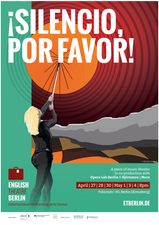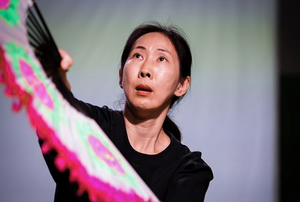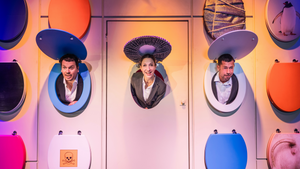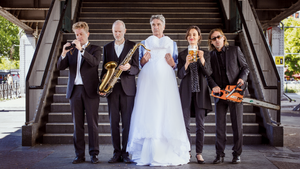PHOTO:
© Foto © 2012, Leo Seidel
Die Zauberflöte
In the organizer's words:
Mixing Viennese folk theater, Masonic mystery, and fairy tale, this opera is probably the most performed in the German-speaking world, and in Günter Krämer's colorfully pictorial production, it is a favorite of our audiences ... Conductor: Dominic Limburg / Giulio Cilona; Director: Günter Krämer; With Tobias Kehrer / Patrick Guetti / Ante Jerkunica, Matthew Newlin / Attilio Glaser / Kieran Carrel, Hye-Young Moon, Sua Jo / Siobhan Stagg / Lilit Davtyan, Flurina Stucki / Maria Motolygina, Karis Tucker / Annika Schlicht / Arianna Manganello / Irene Roberts, Lauren Decker, Lilit Davtyan / Hyejin Lee / Meechot Marrero, Philipp Jekal / Artur Garbas, Burkhard Ulrich / Gideon Poppe, Ya-Chung Huang and others.aPrince Tamino is threatened by a wild dragon. At the last minute he is saved by three mysterious women, emissaries of the Queen of the Night. When the bird catcher Papageno appears and boasts about the heroic deed, they punish him. They present the prince with a picture of Pamina, the queen's daughter, who is being held captive by the ruler of the Temple of the Sun, Sarastro. Tamino falls in love with her. Then the queen herself appears and orders him to rescue Pamina together with Papageno. A magic flute is to protect him from danger, and the reluctant Papageno is given a magic glockenspiel. Guided by three boys, the two set off for Sarastro's castle. While Tamino is twice rejected by the castle guards, and the third time is taught that Sarastro is not the cruel despot the queen has made him out to be, Papageno finds Pamina and tries to escape with her. He is able to keep her guard Monostatos at bay with the help of the glockenspiel, but the appearance of Sarastro destroys all efforts. Papageno, Pamina and Tamino must remain in Sarastro's temple. They are asked to undergo life-threatening tests. First, they must learn to be silent, a difficult undertaking especially for Papageno. When an old woman comes along, he can't stand it any longer and asks her for her name. With a thunderclap she disappears again. Papageno consoles himself with food and drink, which are miraculously served to the two, only Tamino remains silent and plays his flute. Pamina arrives and is distraught because Tamino no longer speaks to her. Her mother has previously tried in vain to persuade her to kill Sarastro. When she wants to put an end to her life, the three boys snatch the dagger from her and lead her to Tamino. Both pass through fire and water, protected by the flute, and have thus passed all the tests. Meanwhile, Papageno, in his loneliness, wishes for the old woman again and promises to take her as his wife "as long as nothing better is found". Then she suddenly turns into a young, pretty girl, but the time has not yet come, she is snatched away from him again. In despair he wants to take his own life, but the three boys remind him of the chimes. Its sound summons Papagena, and both dream of a happy future. The other couple is also happy: Tamino and Pamina are accepted into the community of initiates and glorify the ideals of nature, wisdom, reason. Only the Queen of the Night comes to a bad end: when she tries to enter the temple with her entourage, she is devoured by the forces of darkness.
Mozart's MAGIC FLUTE, the most frequently performed opera in the German-speaking world, the multi-layered masterpiece in the unusual mixture of Viennese folk theater and Masonic mystery, fairy tale and myth, still puzzles us today: Did Mozart and his librettist Schikaneder switch fronts between the Queen of the Night and Sarastro in the middle of the work? Isn't distrust indicated towards the all-too-holy priestly world and its ideology, which divides the world into good and evil? Are there not even traces of a distance between text and music, as some Mozart specialists suspect? Nevertheless, it is precisely the music that elevates the contradictions of the plot into the realm of the world. It does not denounce its characters, but gives their conflicts an existential dimension. Without it, the opera would sound like an irrational fairy tale. This content has been machine translated.









